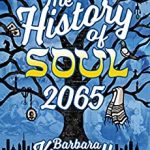The History of Soul 2065, A Review
The History of Soul 2065, A Review Interlocking stories with a magical realism and speculative fiction feel This gorgeous set of interlocking stories follows the souls of two families as they navigate the 20th and 21st centuries.Each story is the literary equivalent of a gem and collectively tell a tale with elements of magical realism, […]

